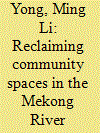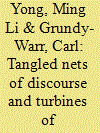|
|
|
Sort Order |
|
|
|
Items / Page
|
|
|
|
|
|
|
| Srl | Item |
| 1 |
ID:
194470


|
|
|
|
|
| Summary/Abstract |
Hydropower development taking place on the Mekong River’s mainstream and tributaries across the river basin, including Cambodia, is threatening livelihoods and food security by altering critical mobilities associated with the unique ecosystems of the Mekong River. In this paper, we seek to understand how a politics of mobility around hydropower development links both human and nonhuman entities along the Mekong River in Cambodia. We examine how dams transform myriad localized cross-border and riparian political geographies of the physical-human landscape through partial enclosures, up-downstream reorderings and b/orderings of hydrosocial relations. To explain these transformations, we posit that it is necessary to pay attention to the politics of human and nonhuman (such as water, sediment, and fish) mobilities that are shaped by hydropower dams and the new forms of mobilities engendered as a result. We examine how hydropower development renders water, fish, and sediment immobile, or alters their routes and rhythms in ways that optimize the generation of hydropower but which create new concerns around these changing nonhuman mobilities for riparian communities in Cambodia. There is a tension that exists between technical representations and community experiences of these nonhuman mobilities, which raise implications for the exacerbation of vulnerabilities among Cambodian Mekong communities. In this paper, we focus our analysis on selected sites in Cambodia: 1) Stung Treng Province, downstream of Laos’ Don Sahong Dam and the Cambodia-Lao border riverscape, and 2) the Tonle Sap Lake (water-based and floodplain areas), to highlight these changing mobilities and the critical processes of b/ordering.
|
|
|
|
|
|
|
|
|
|
|
|
|
|
|
|
| 2 |
ID:
174811


|
|
|
|
|
| Summary/Abstract |
In Northern Thailand's Chiang Khong district, which lies along the banks of the Mekong River and the Thai‐Lao border, an community‐based environmental movement under the leadership of the Rak Chiang Khong conservation group emerged in response to processes that have appropriated territories traditionally used by locals for state‐led economic exploitation. The Rak Chiang Khong has put up fierce opposition to large‐scale development projects such as the China‐led navigation project, which planned to blast ecologically and culturally significant rapids, and hydropower dam development along the Mekong River. As a result, local‐level governance arrangements of the transboundary commons in Chiang Khong have shifted to counter threats both within and beyond the borders of Thailand. Through adapting fishing arrangements, engaging in community‐led research and establishing village conservation zones, overlapping forms of territorialisation have emerged in response to socio‐ecological changes to the river. These new forms of territorialisation are produced by complex configurations of political, cultural, and ecological histories, politicaleconomic changes, and transboundary dynamics. These territorial strategies have been key towards reclaiming the transboundary commons of the Mekong River for riparian communities, and providing a deeper understanding of the values that drive community involvement in the transboundary environmental governance of the Mekong River.
|
|
|
|
|
|
|
|
|
|
|
|
|
|
|
|
| 3 |
ID:
123513


|
|
|
|
|
| Publication |
2012.
|
| Summary/Abstract |
Hydropower development on the mainstream of the Mekong River in the Lower Mekong Basin (lmb) has become one of the most pressing issues on the development agenda, being touted as the way forward in solving energy, development and sustainability needs in the region. Despite dominant and compelling arguments in favour of such development, a growing anti-dam lobby has taken to arguing that hydropower development will threaten the economic, social, environmental and food security of some 62 million people living in the lmb. The anti-dam lobby comprises a heterogeneous assemblage of actors, agencies and networks, working to provide critical and alternative geographical (re)imaginations of the lmb. This paper explores these multiple perspectives afforded by the anti-dam lobby through the lens of knowledge production. The anti-dam lobby, it will be seen, engages in a politics of legitimacy and re-scaling with the pro-hydropower lobby, played out through varying strategies, while highlighting urgent and critical knowledge gaps which need to be taken seriously for future development in the lmb.
|
|
|
|
|
|
|
|
|
|
|
|
|
|
|
|
|
|
|
|
|